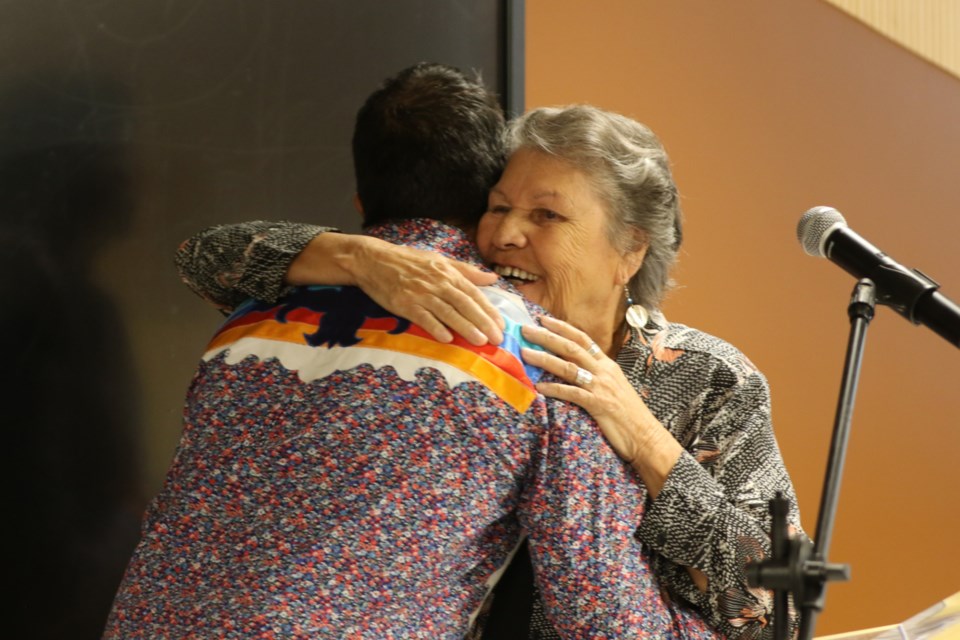Sault Ste. Marie MPP Ross Romano has announced $2 million in provincial funding through the Northern Ontario Heritage Corporation that will go towards the construction of Makwa Waakaa’igan at Algoma University.
Replacing the east wing of the university, the new three-storey building will serve as an Indigenous education facility with classrooms, cultural areas and archival materials held by Shingwauk Residential Schools Centre. The $43.3-million facility will also be home to the Mental Health and Addictions Research and Training Institute that’s being established in partnership with the Northern Ontario School of Medicine University.
“These two initiatives working together have a real potential, I think, to allow us to heal,” Romano said during an announcement held at Algoma University Wednesday.
Children of Shingwauk Alumni Association (CSAA) co-founder Shirley Horn says Makwa Waakaa’igan is very much a part of the survivor group’s journey, which began in 1981 to acknowledge the history of Shingwauk Indian Residential School and the stories of those who attended the institution.
“It’s all about that journey from that residential school and the many, many steps that it’s taken to come to a place of healing, and that’s what Mukwa Waakaa’igan is — it’s going to be the physical integrity of that vision and that dream,” Horn said following the funding announcement. “I can’t wait for the building to come into fruition.”
The Shingwauk Residential Schools Centre (SRSC) contains a vast archival collection — some of it compiled through materials and stories from CSAA meetings and gatherings over the years — for the former residential school site in Sault Ste. Marie where Algoma University stands today.
“Those are the important things, because they talk about their life here, their life when they went home, or when they didn’t go home — some children never went home,” said Horn. “Those are all things that each individual who went to this school had to deal with in their own way and process that.”
The archival space at Makwa Waakaa’igan will also contain SRSC archives from an industrial home for boys at the former Shingwauk site and the Wawanosh School for Girls locally, in addition to records from Spanish Indian Residential School in Spanish, Ont., and St. John's Indian Residential School in Chapleau, Ont.
Makwa Waakaa’igan Director Joel Syrette says Wednesday’s funding announcement acknowledges the work of CSAA throughout the years by preserving the archival collection at Shingwauk Residential Schools Centre, while supporting the education of truth and reconciliation and the legacy of residential schools on a broader level.
“It’s through their collaborative efforts that what is now becoming a realization for working towards reconciliation in this country, I think we are acknowledging, we are honouring the prayers, the hopes, the aspirations — also recognizing the strength, the resilience, the perseverance — of an incredible group of people, an incredible generation of people,” Syrette said. “It’s very heartfelt to see those who are still here with us, they are seeing this dream, they are seeing their efforts come to fruition.”
Syrette believes the facility will also help to support programs at Algoma University by helping students understand the legacy of residential school and impacts of intergenerational trauma.
A memorandum of understanding was signed with the Northern Ontario School of Medicine University with a focus on addictions, mental health and intergenerational trauma, according to Syrette, and how culturally-informed practices can support the healing process — a project, to his knowledge, that has never been done before.
“That’s not a practice that I think any one institution can make or determine. That’s to be done in partnership with community, with traditional people, and to recognize both bodies of knowledge — both ways of knowing — and really creating a path forward,” he said.
Algoma University has dedicated more than $19 million to Makwa Waakaa’igan, with the federal government kicking in a total of more than $12 million to date.
Construction of the building is set to begin this fall, and is expected to be completed sometime in 2026. Construction and project timelines are subject to change, according to a release from the university, as the school is providing "space and support" for the Indigenous-led site search for unmarked burials at the former residential school site.
